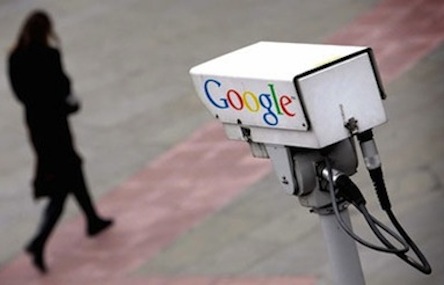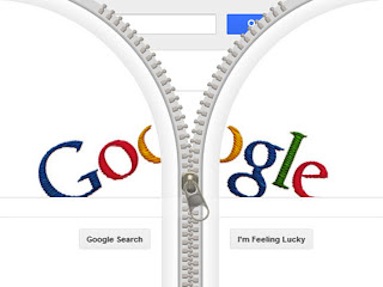 Ever use Google’s Street View feature?
Ever use Google’s Street View feature?
I do all the time, most recently when a friend heading to the Rockies in her Jeep asked me for trail ideas. Having hiked and camped Rollins Pass many times, I Googled it. I followed the trail from the Moffet Railroad tunnel all the way up to Yankee Doodle Lake. I’ve used it to check future project access and – always being interested in what’s going on down at the beach – I’ve looked at new condos and proximity to the beach; it’s pretty handy.
You can literally walk down the street, anywhere, and never leave the office.
Do you wonder how they get all those pictures in such a seamless manner? They drive down each and every street in one of their funky little robot looking cars with the tripod on top and cameras on every fender. They take the shots; we get a handy little feature on our desk top.
No problem, right?
Well, the Court says big problem.
Google haven’t just been taking pictures, they’ve been coming “inside” your home. How you ask? If you have unencrypted Wi-Fi, in a single drive by they download a payload of data including your email, contents, passwords, phone numbers, banking info, anything that’s on your PC becomes theirs.
Street View was a privacy problem from the get go and on Tuesday Google lost its US Appellate Court appeal.
Google announced the program on May 29, 2007 even though much of it was preloaded and available for viewing.
 One day later the Internet zine BoingBoing was first to express concerns over privacy when a lady complained the images were so good her cat could be seen in her living room. In September 2007 Canada complained the images, people’s faces and license plates were too easily recognized.
One day later the Internet zine BoingBoing was first to express concerns over privacy when a lady complained the images were so good her cat could be seen in her living room. In September 2007 Canada complained the images, people’s faces and license plates were too easily recognized.
I have no problem with that, you can’t protect what’s easily seen on an evening walk, but the plot thickened and the data got deeper.
By 2010 Italy, Germany, Hong Kong, England, Switzerland, the snooty French and Austria joined in. Austria went as far as banning Google cars from its streets.
Then it began to leak out just how truly invasive this service was.
Stateside, the fight centered on The Pen/Trap Act, 18 U.S.C. §1030 and the Federal Wiretap Act; it is illegal to “intentionally intercept any wire, oral, or electronic communication.”
At first Google denied they’d collected any data. Pushed further, they admitted to “inadvertently collecting fragments.” But as pressure mounted they finally admitted “in some instances entire emails and URLs were captured, as well as passwords.”
An early FCC investigative report showed that an unnamed software engineer who developed the code, dubbed Engineer Doe “made it clear in October 2006 emails to a Street View project senior manager and project leaders that the code would collect and store personal payload data, which included email and text messages, passwords, Internet usage history, and other personal information.
“In addition, the FCC found that the project’s leaders had forwarded Engineer Doe’s email to the rest of the Street View team. With this knowledge, the Street View team collected approximately 200 gigabytes of payload data from January 2008 to April 2010 in the U.S. alone.”
That forced a 2010 apology from Google’s Senior VP of Engineering, Alan Eustace, in which he stated they had inadvertently – there’s that word again – gathered sensitive information with its Street View cars and stated they would implement three changes to prevent future incidents.
The “plan” was typical corporate damage control BS and included training employees in security awareness, providing them guidance in collecting and handling data and, lastly, adding new internal compliance policies that would document how data is handled and institute a “regular review” by managers and an independent audit team.
He went on to state Google “failed badly” in gathering the data using Street View cars.
Google then settled a $7 million lawsuit with 37 States and DC.
Failed badly: You buy that?
Google knows exactly what it was doing and always has. No one I can think of in the private sector collects more demographic psychographic information on their customers than Google.
We know it, but we all use it every day.
Google has held all along they’ve done nothing wrong; they just captured signals in the air, available to anyone, same as tuning in to 98.9 FM on your radio.
Judge Jay S. Bybee’s opinion was different, saying, “Wi-Fi transmissions are not readily accessible to the general public because most of the general public lacks the expertise to intercept and decode payload data transmitted over a Wi-Fi network.
“Even if it is commonplace for members of the general public to connect to a neighbor’s unencrypted Wi-Fi network, members of the general public do not typically mistakenly intercept, store, and decode data transmitted by other devices on the network.”
And with that, Google lost its appeal giving the go ahead for privacy lawsuits against them. Trust me, this is going to be huge, I don’t care how lawyered up Google is. As more and more details creep out public pressure on them is going to be enormous.
When handed the loss Google said, “We are disappointed in the Ninth Circuit’s decision and are considering our next steps.”
I bet they are.
Maybe its next step could be to stop stealing people’s data.
As of 2012, investigations have gone forward in at least 12 countries and 9 countries have found Google guilty of violating their laws. Despite its admissions and the FCC’s findings, Google still maintains that it did not break the law in any way.
You think there’s any privacy anywhere in anything we do? This could only get better by seeing a full blown NSA/Google partnership – that’s pretty much all that’s missing from this story.
The real question is; will this change a single thing we do?











you could smash your keyboard and quit spewing drivel here; that’d be a change – for the better.
Wake, I have pictures of you and Puggles, down on her farm, doing unspeakable things; do not make me release them.
Fear and be vigilant towards Google, they are not as benevolent as they appear to be.
Dude, I don’t think they have a benevolent bone in their collective corporate body! The free email started out easy enough. Then once you signed up, somehow pop ups started to show up that exactly matched your interests or things you’d recently looked on, on eBay, for example.
Then word spread they scan the text of your emails and store it to match key words. Not too much longer, they were selling info to other service providers based on your personal info so they could more carefully target your buying psychographics. And like slowly boiling a lobster, you don’t know you’re cooked until your well done!
And we are worried about the NSA?
Then they told people that had ‘alleged secure email service’ through gmail had no expectation of any privacy whatsoever.
So… Is it wrong that the first thing I did was Google Search to fact check your story? Do “they” know I was checking up on “them”? Am I in danger now? I’m afraid.
Janie, you were driving the Jeep, no need to fact check it. If they come after you, I’ll protect you….
Harleys house is so big they had to drive past it 3 times. Just to get it all in frame.
Fact.
Yeah, the OP sewage treatment plant #3 is pretty damn big.
The NSA is child’s play to what American’s give up everyday for convenience. Save big and get “free” gas from Price Chopper, hey get your Ace hardware card and save big time points…..and we do it willingly. Marketing folks can build a “profile” on you based on your home address that is uncannily accurate. Census data is available as a download, just pay the price, and all your buying preferences are available for a price. Google is the most aggressive and their value shows how much marketing pro’s are willing to pay for buyer information. The majority of search engines collect data and sell it, there are a few that don’t record your IP as you search, supposedly.
We love you George Orwell.
Karl, thats the big push with the reagan.com email addresses you see advertised, they promise no mining, scanning or info sharing. I would assume they may do some, however, inadvertantly…..
As the saying goes. Jokes on them, I’m behind SEVEN PROXIES
Love me some Balbonis!
Sounds slow to me.
Will this change a single thing we do?
It depends on what you’re doing online. If I need to adjust my Royals cap, it makes no difference to me if I’m alone or in a crowded bar. However, if I need to scratch my balls, how I do it may depend on my location. Likewise, if I’m doing things online that I wish to remain private, or even somewhat private, I am more apt to take alter how I go about doing them online, than if I’m electronically adjusting the Royals cap on my online avatar.
The problem our society and laws are eventually going to bump into, and bump into rudely, is the first time a major court decision comes down which reflects the changing nature about our expectation of privacy. Much of privacy law is measured based upon one’s reasonable expectation of privacy and our collective reasonable expectations are rapidly changing as we have a new generation of young adults who came of age post 9/11 and have no objection to oversharing what used to be personal intimate details and view an Orwellian present as a fact of life rather than a societal choice. The government prefers and promotes this notion as well. Eventually, if enough of us remain asleep at the wheel, our reasonable expectation of privacy will be gone and then POOF so will much of the basis for today’s privacy law.
Google has had a long relationship with the cia. Cia vc money helped fund them in the early days. Now, cia vc firm in-q-tel and google are teaming up to invest in new security related startups. The last one was a firm that was working on linking cctv feeds to search engines.
http://en.m.wikipedia.org/wiki/In-Q-Tel
Yeah, CIA and NSA loves them some Google.
Except for live camera views, many Google so-called street views are extremely dated still shots. I looked up my neighborhood as a test, and found the view of my house is more than four years old. Then I attempted to view a friend’s 2-year-old business location downtown. The building was not there! That’s because the Google photo of that address was outdated and still showed an old gas station that doesn’t exist any more. So not only is it a 100 percent invasion of our privacy, but it’s not even that reliable!!